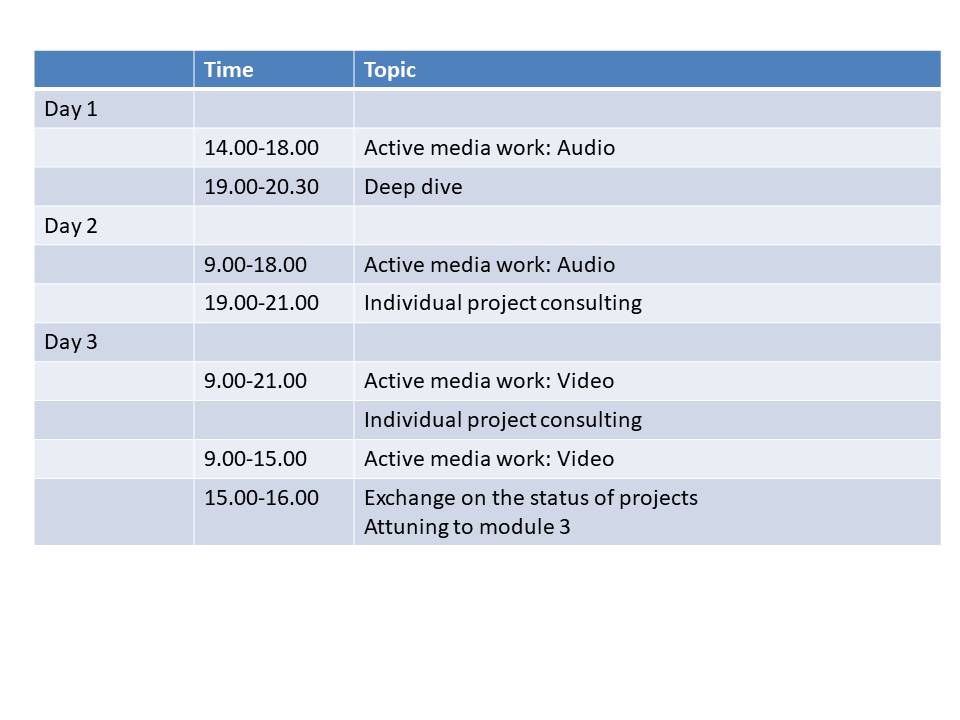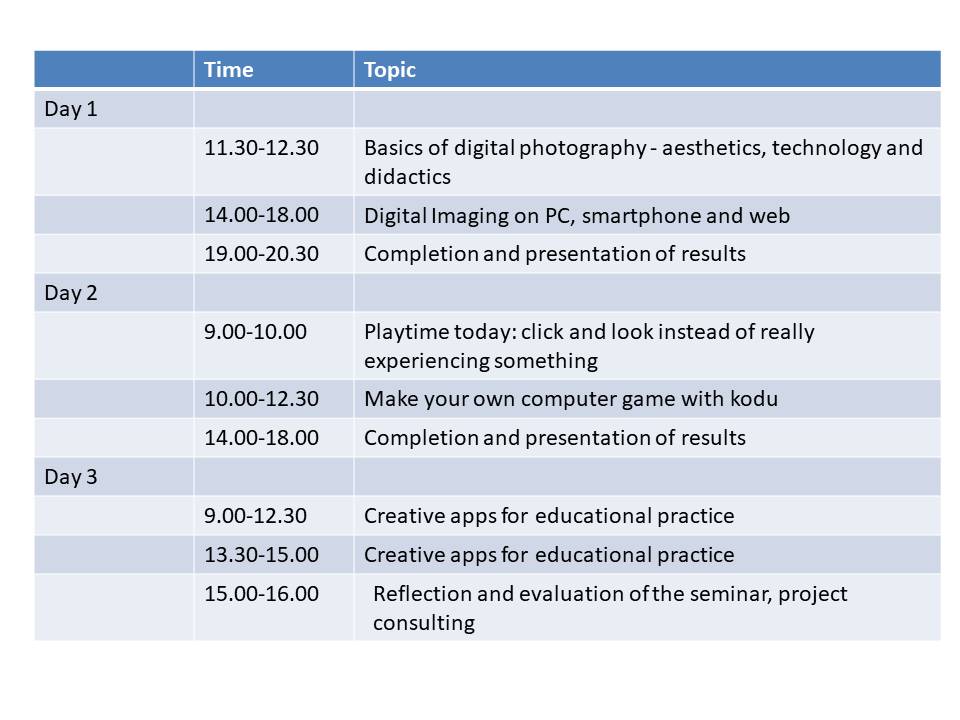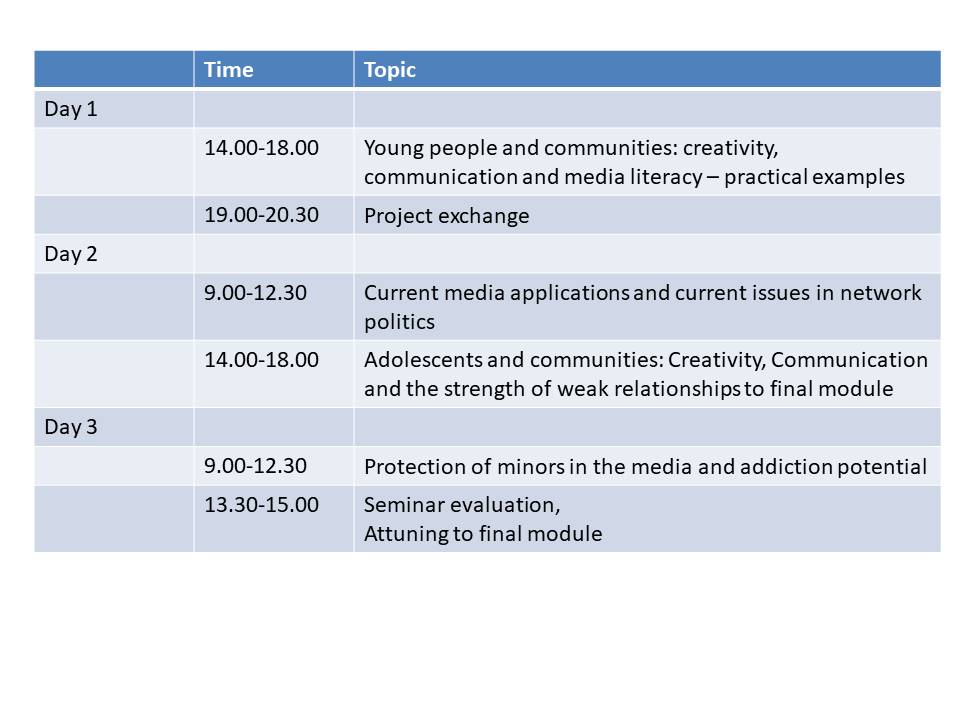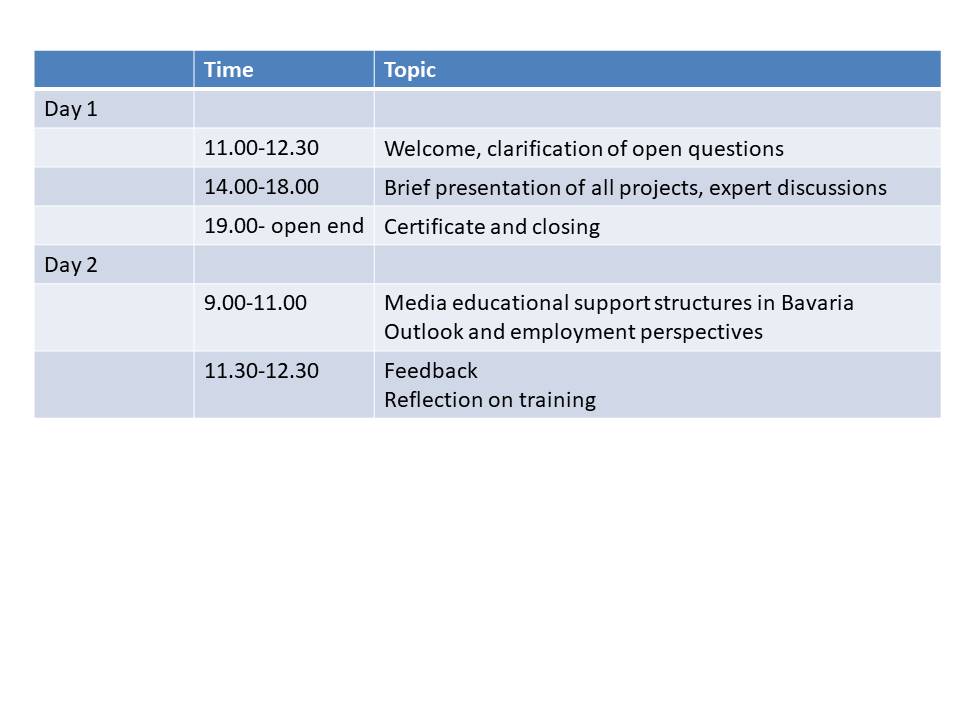Media Education in Youth Work
Organising institution/partners
JFF - Institute for Media Research and Media Education in cooperation with Institute for Youth Work
Country
Germany
Hashtags (key words)
#media literacy competencies #media literacy education #youth work #active media work
Main topic/theme
Enable youth workers to integrate active media work in youth work
Media Literacy Competencies/Aims/Expected Outcome
The knowledge acquired as part of the training in media education theory is intended to enable youth workers ...
- to critically analyse developments in the media and to reflect the related technological, aesthetic, legal and economic foundations.
- to get acquainted with the media usage of children and young people, regarding its significance and also to get to know media educational concepts for an active and action-oriented handling of media.
- to gain technical, aesthetical and pedagogical competence, in order to implement and further develop media education projects in their own fields of work.
Participants - age
Youth workers and other persons working in the educational sector with adolescents
Participants - number
12
Participants - entry competencies/skills
Employees in the youth work and education sector who want to ...
- gain an understanding of the importance of media spaces for young people.
- be able to assess the various applications of the Internet (e.g., web 2.0, Youtube, games).
- implement their own active media work projects.
Media literacy encompasses four aspects:
- Participation in the political and cultural development of our society (this includes legal knowledge, use of the Internet's potential for individual and community goals, participation).
- Ability to create media products.
- Apply and link this knowledge of creating own media products within a multimedia space.
- Recognise connections between digital worlds and real life worlds, relate them to economics, innovations and value
Methods/Type of activities
Group training; there are involved experts that have practical experience in the individual subject areas
Description - step by step
Module 1: Youth in the media space
Foundations of media education: Media usage by young people, goals and concepts in media educational practice
Media play a central role in the everyday life of adolescents. They provide entertainment and information, but also help orientate young people in day to day life. In order to grasp the meaning and impact of media, it's not enough to ask what they offer young people, but also how young people interact with what's on offer. The main focus of this introduction is an analysis of the way young people use media. What do they do with and within different media? Which media offerings do different age groups turn to? What fascinates girls? What inspires boys? Which media activities collide with desirable socialisation standards? Based on these questions, the goals and concepts of media educational practice are outlined and the basic principles of action-oriented media education are illustrated.
The online socialisation space
Children and adolescents participate in many determined educational and development processes. Classical educational histories are becoming less prevalent. Instead, varied possibilities and choices are available. In addition to society's requirements to integrate and find a place, other adolescent development tasks come into conflict with these expectations. New media appear to be an important space where young people can be amongst themselves. However, the use of new media changes relationships between individuals and within the family; time and place take on a new quality.
Copyright and exploitation rights in media education projects
- The scope of action for educational staff in media and web 2.0 projects
- Copyright/personality rights in online communities
- What should education professionals make young people aware of?
Creative Commons
Creative Commons (CC) is a non-profit organisation that provides support for the publication and distribution of digital content in the form of boilerplate license agreements. Their use offers legal security, as well as an opportunity to become familiar with non-commercial online offerings.
Characteristics of professional media education
What skills does a media education professional need? How are learning processes organised? What role does the relevance of media work to lived experience play in different target groups and thematic areas? How do media work, youth work, pedagogy intersect? First reflections on a media-pedagogical project

Module 2: Active Media Work, Part 1
Radio work with children and adolescents
Podcasts are becoming increasingly popular: They are easy to produce and versatile. A recording device, microphone and laptop are all you need to create an exciting radio project with children and young people. From surveys and reports, to small radio plays and funny presentations – radio projects are versatile and fun. The workshop provides basic journalistic and technical knowledge and shows how to set up a radio project with minimal resources. The participants develop a small radio programme and learn numerous techniques through practical experience, from the right way to pose an interview question to audio editing.
Active media work with young people: Films
Filming is fun and offers a wide range of opportunities for children and adolescents to get creative. With a digital video camera and computer video editing program, it's easy to create a feature film, a documentary or a comedy. However, a successful film project requires more than technical equipment. Knowledge of dramaturgy and a basic understanding of film production are also necessary. This module provides an introduction to the production of video films with young people. Starting with the most important principles of dramaturgy in the development of a film idea, to technical questions about editing, sound and digital video formats, the basics of video film work are introduced and important practical questions about filming are answered. The aim of the seminar is to provide all knowledge necessary for the successful preparation and implementation of a film project with youth groups.

Module 3: Active Media Work, Part 2 Digital photography, simple PC games, creative apps
Digital photography and digital imaging
With a digital camera and smartphone, interesting and exciting media projects can be implemented with children and young people. In an age of Facebook, Instagram and web 2.0, digital images are omnipresent. It's important to draw on the full range of photographical and technical design tricks. In this part of the course, the fundamentals of digital photography - aesthetics, technology and didactics - are presented and apps for working with children and young people are introduced. The possibilities of digital imaging on PCs and smartphones are tested and implemented.
Programming a computer game
The gaming behaviour of children and adolescents is a common cause of conflict between children and parents. While traditional games such as board games are accepted as a form of playful learning, computer games are rarely considered to provide learning potential. Examples and results from learning psychology prove that the reality is quite different. Subsequently, the production of a self-programmed computer game (using free programme kodu) lets participants experience the learning potential of computer games in a playful manner.
Creative apps for educational practice
Apps have fundamentally changed the media society: Not only online services and offline offerings are provided as apps, but also games, learning programmes and creative applications for children and adolescents. Apps have changed the use of smartphones thoroughly: These small applications serve as mobile communication tools, digital service providers, permanent breaking news tickers or mini games to pass the time. They are available everywhere and add to the panoply of available media. Creative apps that can be used in childhood or youth work are presented and played with. Apps can be destructive time-killers or a creative tool – we introduce those that make the difference.

Module 4: Internet applications in youth work
User participation and permanent exchange are characteristic of modern Internet applications. New forms of involvement, participation, engagement and co-determination are emerging. Blogs/web 2.0/messenger services or Youtube create new ways to design and communicate, the main effect being that users get in touch digitally - often over long distances, but with similar interest. Humans and their relationships are becoming more and more important. The individual's need for relationships is absorbed and linked with the possibilities of the mostly visual applications. In digital media culture, there is a growing need to communicate with other people, to exchange experiences and knowledge. A basic need for interpersonal communication is identifiable. Integration into a social community is regarded as a necessity, in order to assert oneself in society. The everyday exchanges young people experience in social networks, instant messengers, Twitter, and Youtube shape their viewing habits and their perception. Youth work has to develop appropriate concepts based on this development, offering young people the opportunity to self-reflect, participate socially and develop their creativity, while at the same time adapting and developing the competence to deal with the abundance of possibilities.
Networked society as opportunity for media education - Media education as an opportunity for networked society
The Internet is the electrification of society. With its penetrating forms of communication, it opens up new opportunities for development that offer perspectives for action in education and participation. Media education professionals face the challenge to seize upon the possibilities of the Internet and actively contribute to the design process as an accompanying partner. The communication networks of generations in social networks hint at points of contact, new mobile services point the possibility of a location based community network. It is necessary to create digital youth education that goes beyond media competence.

Final module
On the one hand, the final module is (formally) about the individual verification of the competency gained. This is achieved through the presentation of the implemented practical project, and the subsequent discussion of this project with practitioners. On the other hand, it is, of course, important to reflect on this process for each individual participant. As an outlook towards future professional opportunities, media educational support and networking structures in Bavaria are presented.

Participating speakers
Liesching, Marc, Dr., Lawyer specialised in media law (module 1)
Demmler, Kathrin, Director JFF – Institute for Media Research and Media Education Munich (module 1)
Seitz, Chris, "mediale Pfade" – Agency for Media Education Berlin (module 1)
Michaelis, Elke, Media Pedagogue, responsible for "Störfunk" youth radio on afk in the Media Centre Munich (module 2)
Bloech, Michael, Media Pedagogue at the JFF - Institute for Media Research and Media Education, Focus: video technology and youth film work (module 2)
Ring, Sebastian, Media Pedagogue at the JFF - Institute for Media Research and Media Education (module 3)
Lutz, Klaus, Educational Director of the Media Centre Parabol Nuremberg (module 3)
Friedrich, Björn, Media Pedagogue at SIN Studio im Netz Munich (module 3)
Röll, Franz-Josef, Prof. Dr., University of Darmstadt, Department of Social Sciences and Social Work, Focus: new media and media education (module )
Ertelt, Jürgen, Network Activist, longtime employee for media educational projects operated under the IJAB (module 4)
Palme, Hans-Jürgen, Media Pedagogue, head of SIN Studio im Netz München, member of the GMK's national executive board (module 4)
Orta, Tanja, Dipl. Social Pedagogue, Condrobs Munich e. V., Project Inside (module 4) Anfang, Günther, Media Pedagogue, head of the practical department at the JFF – Institute for Media Research and Media Education, editor of the journal "medien + erziehung" (overall management)
Fußmann, Albert, Diploma Pedagogue, Cultural Pedagogue, Director of the Institute for Youth Work, editor of the magazine "medien + erziehung" (overall management)
Resources
Time/Duration
The training covers ... four seminar modules, plus a graduation module (15 days total). the development and implementation of a media educational proposal. documentation, presentation and contemplation of this proposal. Duration of basic training in media education: 15 days total; Three modules consist of three days each, one module consists of four days, the final module consists of two days.
Venue/place
Training room with internet access
Equipments and Materials
Materials and equipment required are depending on the modules (see step-by-step-description).
Human Resources
- project manager
- experts for different subjects and content (experts in Germany, see list)
Certification
A certificate is earned by participating in all modules, by documenting and presenting the
practical project.
Evaluation
In Germany the training is offered for several years.
Participants are supposed to give feedback during the training, e.g. at the end of the modules 3, 4, and the final module. They also get feedback from the project managers. Each participate can earn a certificate.
Management
Günter Anfang (JFF) and Albert Fußmann (Institute for Youth Work) lead the training throughout.
Further Information
http://medienfachberatung.de/zusatzausbildung-mit-zertifikat/
Contact
Media Centre Munich (mzm)
Guenther Anfang guenther.anfang@jff.de
The publication was created as part of the project: EMELS
This publication reflects the views only of the author, and the Commission cannot be held responsible for any use which may be made of the information contained therein.

